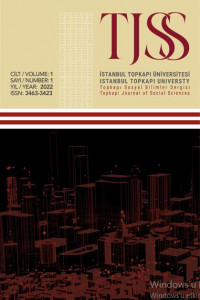Poverty and Local Equality Plans: An Analysis of İstanbul, İzmir, and Ankara
Yerel yönetimler, cinsiyet eşitliği planları, toplumsal cinsiyet ve yoksulluk, toplumsal cinsiyet ve belediyeler, toplumsal cinsiyet eşitliği
Poverty and Local Equality Plans: An Analysis of İstanbul, İzmir, and Ankara
Local government, gender equality plans, gender and poverty, gender and municipalities, gender equality,
___
- Ameyaw, K. D. and Bawole, J. N. (2009). Localizing and sustaining poverty reduction: experiences from Ghana. Management of Environmental Quality An International Journal 20(5):490-505. DOI:10.1108/14777830910981186
- Ankara Büyükşehir Belediyesi Yerel Eşitlik Eylem Planı 2021-2024 (2021) https://www.izleme.org/ankara-buyuksehir-belediyesi-yerel-esitlik-eylem-plani/
- Ashaver, B. T. (2013). Poverty, inequality and underdevelopment in third world countries: Bad state policies or bad global rules? Journal of Humanities and Social Science (IOSR-JHSS), 15(6), 33–38.
- Batal, S. (2016). Yoksulluk kavramının yerelleşmesi: Kentsel yoksulluk ve yerel yönetimlerin konuya yaklaşımı. International Journal of Social Science, 52, 301-316.
- Carter, M. R., & Barrett, C. B. (2006). The economics of poverty traps and persistent poverty: An asset-based approach. Journal of Development Studies, 42(2), 178–199.
- Dixon, J., & David, M. (2002). Poverty: A Persistent Global Reality. London. Routledge.
- Domfeh, K. A., & Bawole J. N. (2009). Localizing and sustaining poverty reduction: experiences from Ghana. Management of Environmental Quality: An International Journal, 20(5), 313–336.
- Fernandez Lopez, L. and Schonard, M. (March 3,2022). An ambitious future for Europe's women after COVID-19: mental load, gender equality in teleworking and unpaid care work after the pandemic. FEMM Committee European Parliament.
- Genyi, E. (2008). Poverty, good governance and development process in Nigeria. International Conference on Arts and Humanity. 3rd – 7th November. University of Abuja. Nigeria.
- Jütting, J., Kauffmann, C., Mc Donnell, I., Osterrieder, H., Pinaud, N., & Wegner, L. (2004). Decentralization and poverty in developing countries: Exploring the impact. OECD Development Centre. Working Paper No. 236. Paris.
- İnce Yenilmez, M. (2022). How can the post-COVID-19 economy of Turkey help to improve gender equality? International Journal of Social Inquiry, 15(1), 21–32. https://doi.org/10.37093/ijsi.956785
- İstanbul Büyükşehir Belediyesi Yerel Eşitlik Eylem Planı 2021-2024 (2021), https://www.ibb.istanbul/Uploads/2021/3/Yerel-Esitlik-Eylem-Plani.pdf
- İzmir Büyükşehir Belediyesi Yerel Eşitlik Eylem Planı 2022-2023 (2021), https://www.izleme.org/izmir-buyuksehir-belediyesi-yerel-esitlik-eylem-plani/
- Olowa, O. (2012). Concept, measurement and causes of poverty: Nigeria in perspective. American Journal of Economics, 2(1), 25–36.
- Todaro, P. M., & Smith, S. C. (2006). Economic Development. Harlow: Pearson Education.
- Tokman, L. Yıldız (June 27, 2019). A Gender equality approach to Istanbul’s urban development. Transatlantic Policy Quarterly (TPQ). http://turkishpolicy.com/article/962/a-gender-equality-approach-to-istanbuls-urban-development (20.08.22).
- UNDP (September 2, 2020). COVID-19 will widen poverty gap between women and men . https://www.undp.org/press-releases/covid-19-will-widen-poverty-gap-between-women-and-men-new-un-women-and-undp-data-shows
- UNICEF, the World Bankand Oxfam (April 12, 2022). First Crisis, Then Catastrophe. https://www.oxfam.org/en/press-releases/terrifying-prospect-over-quarter-billion-more-people-crashing-extreme-levels-poverty
- UNWOMEN (2020). From insights to action: Gender equality in the wake of COVID-19 https://data.unwomen.org/publications/insights-action-gender-equality-wake-covid-19 (10.08.2022).
- Uzun, A. M. (2003). Yoksulluk olgusu ve Dünya Bankası. C.Ü. İktisadi ve İdari Bilimler Dergisi, 4(2),155-73.
- Wang, S. G. (2004). Poverty targeting in the People’s Republic of China. ADB Institute Discussion Paper. No. 4. https://www.adb.org/publications/poverty-targeting-peoples-republic-china
- Women Friendly Cities United Nations Joint Programme.http://www.Kadindostukentler. com/project.php
- World Bank. (2018). Poverty Statistics. World Bank Group.
- Yeşildal, A. (2020). Yerel yönetimlerin yoksullukla mücadeledeki yeri: Küresel düzeyden yerel düzeye yeni yönelimler. Sosyal Siyaset Konferansları Dergisi/Journal of Social Policy Conferences, İstanbul Üniversitesi Yayınevi, 78: 455-48. DOI: 10.26650/jspc.2020.78.0027.
- ISSN: 2822-3853
- Başlangıç: 2022
- Yayıncı: İstanbul Topkapı Üniversitesi
Gösterişe Yönelik Tüketim Kavramının İncelenmesi
Exploring Urban Poverty in Bangladesh: Dynamics, Coping Strategies and Beyond
Almanya ve Türkiye'de Yaşayan Evsizlerin Kültürel Deneyimleri
Helin Hazal ÇAKMAK, Gökhan GÖKGÖZ
Finding Neverland: Homelessness and Despair in the Urban Space
Tuğba BAYDENİZ, Vesile KÜÇÜK, Hüseyin GÖKAL
Türkiye’de Artan Konut İhtiyacı ve Konut Sorununun Dinamikleri
Simge KUTSAL, Çiğdem POLATOĞLU
Poverty and Local Equality Plans: An Analysis of İstanbul, İzmir, and Ankara
Itır BAGDADİ, Işıl KELLEVEZİR, Huriye TOKER
Türk Hukukunda yoksulluğa karşı nafaka yükümlülükleri, uygulama sorunları ve çözüm önerileri
A POLITICAL ECONOMY OF INADEQUATE HOUSING IN KENYA: A CASE OF MATHARE VALLEY, NAIROBI
